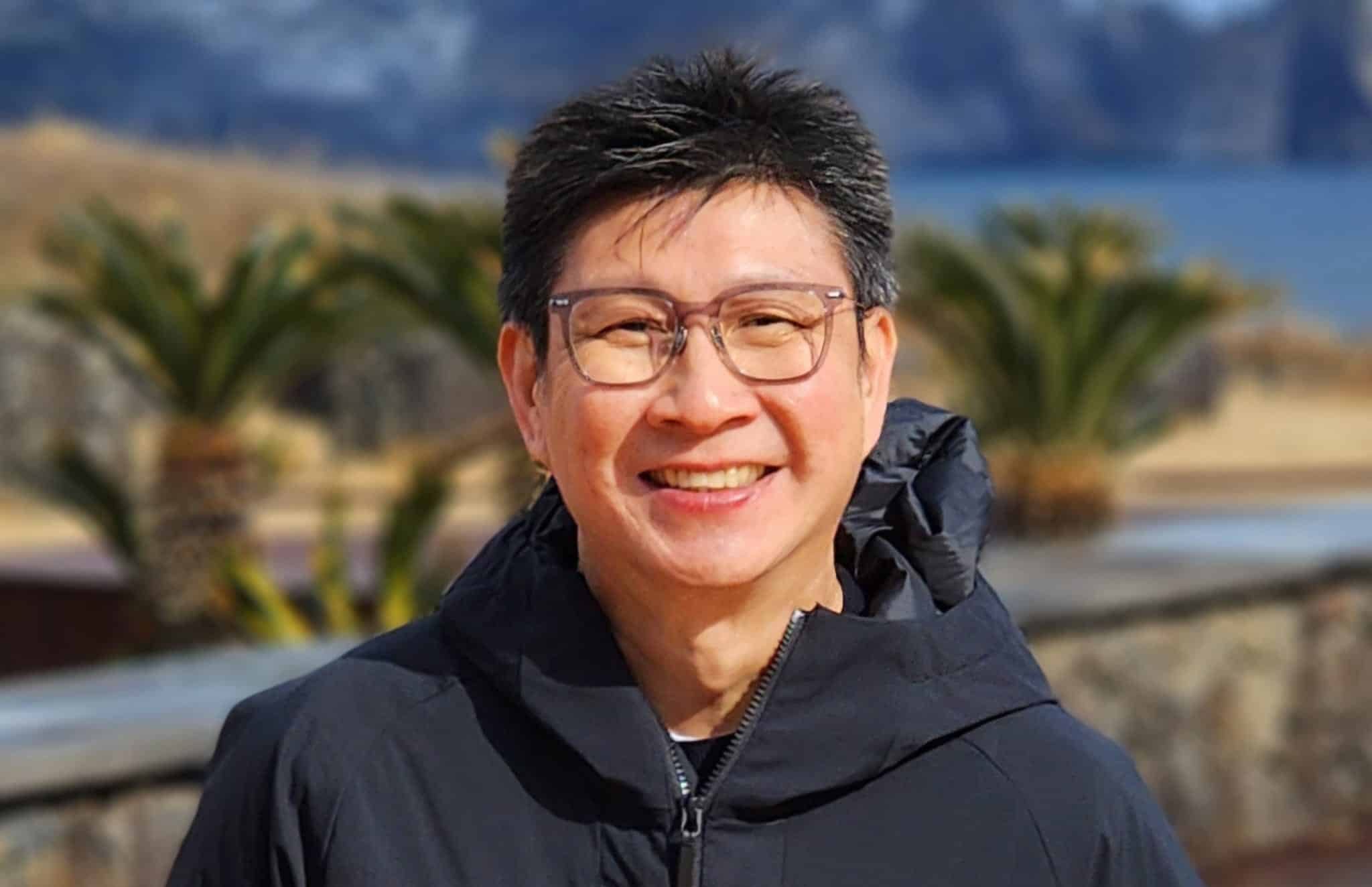12-year-old “miracle child” with Pompe disease inspires parents to start support group for others with rare diseases
by Christine Leow // June 24, 2021, 7:16 pm

Kenneth Mah, son Cayden, daughter Chloe and wife Patricia. Chloe was born with a rare genetic disorder that is often fatal. Mah closed his business to be her primary caregiver. All photos courtesy of Kenneth Mah.
Chloe Mah likes to dress up and get her nails done. She enjoys music, especially K-pop, and has taught herself to play the xylophone on the iPad. She is unbeatable at computer games, at least when she pits her skills against her father.
“She’s very cheeky. She is really like a typical kid,” said dad Kenneth Mah, 51.
But Chloe is anything but typical. She is, by all accounts, a miracle.
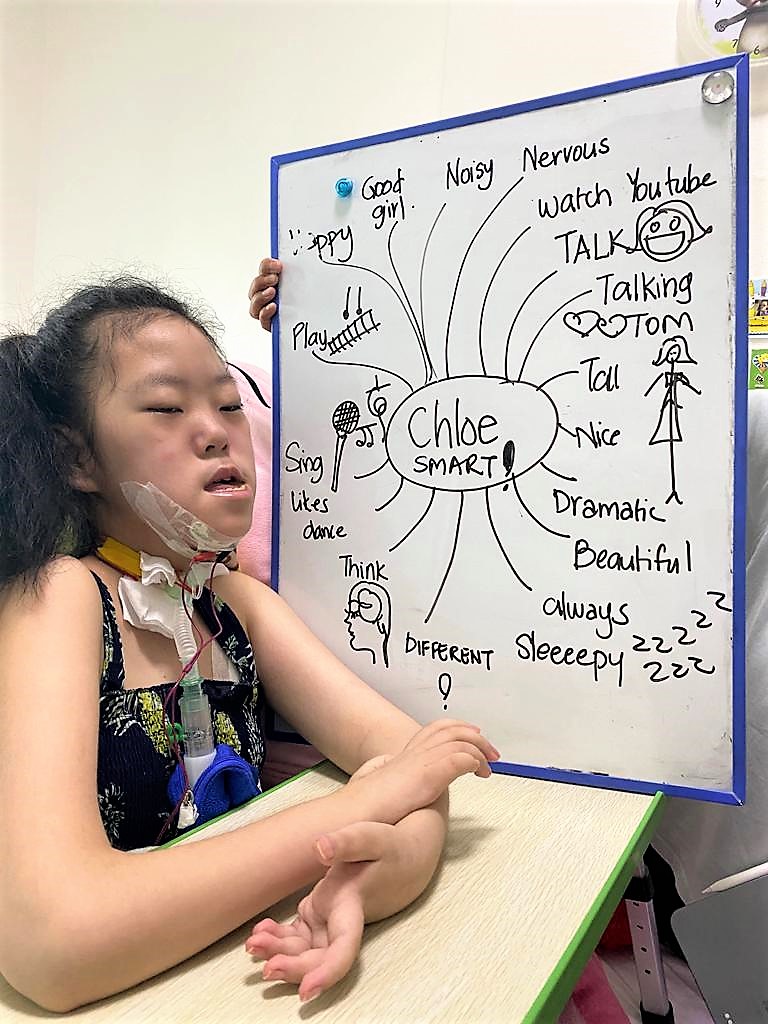
Chloe when she was 11 years old. Although Pompe disease affects the muscles and seriously compromises the functions of the heart, it does not seem to have impaired Chloe cognitively. Her father reports that “her vocabulary is better than mine”.
Born with Pompe disease, a genetic condition so rare that in the last 15 years, the KK Women’s and Children’s Hospital (KKH) has only seen four children with the illness, she was not expected to live past her first birthday.
Chloe is now 12 years old.
“She’s very cheeky. She is really like a typical kid.”
People with Pompe disease have a mutated gene that results in a lack of an enzyme called acid alpha-glucosidase (GAA). GAA is needed to break down a sugar in the body known as glycogen.
Stored in muscle cells throughout the body, excess glycogen can affect both the muscles and the heart. Progressive and debilitating, Pompe disease is often fatal.
Because of her condition, Chloe cannot sit up on her own or breathe properly. She needs a ventilator to support her breathing and a cough assist machine to clear secretions from her lungs.
She requires monitors to measure her heart rate and oxygen level, and communicates by typing on a tablet.
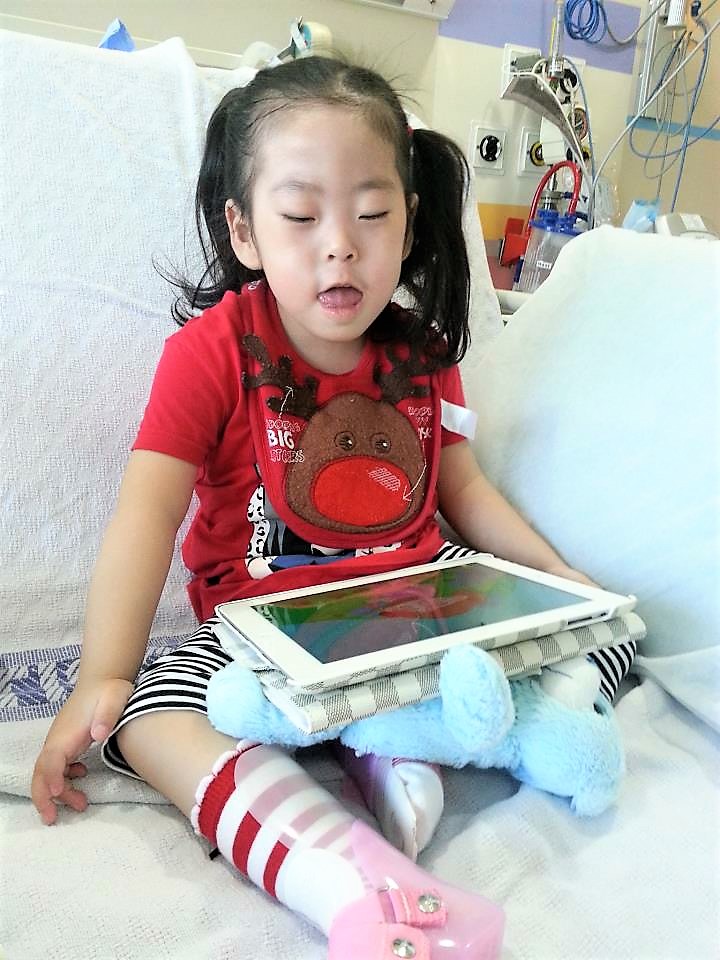
Four-year-old Chloe was already tech savvy. She has since blossomed into a digital citizen, adept at communicating with a tablet and playing computer games.
Because she cannot swallow, she is fed a liquid diet via a button in her stomach. She has never eaten a meal in her life.
She is fed a liquid diet via a button in her stomach. She has never eaten a meal in her life.
“We let her taste things. She likes those biscuits shaped like fish. She always asks for them.”
Chloe has also had many near-death experiences, the most traumatic when she was nine and suffered heart failure.
But she has survived them all, defying the odds. For now, her condition is stable.
“Chloe is doing well,” said Mah, who is her primary caregiver.
In fact, Chloe’s development has surprised even her doctors. She is 1.53m tall and expected to continue growing.
“Doctors say children with Pompe disease should not grow so well. She is really very different.”
An ordinary start
When his wife, Patricia, now 47, was pregnant with their first child, there was nothing to suggest that their baby would be anything but normal. Even though she was born prematurely at 35 weeks, Chloe seemed to be a healthy baby.
Wrote Mah in a website he created to share the family’s journey: “She winked at mummy and stuck out her tongue the moment she was put into mummy’s arms!
“She cried when the nurses took her away from mummy to weigh her. Upon mummy calling her name, she stopped at the familiar voice. How intelligent, and all thanks to the months of bonding.”
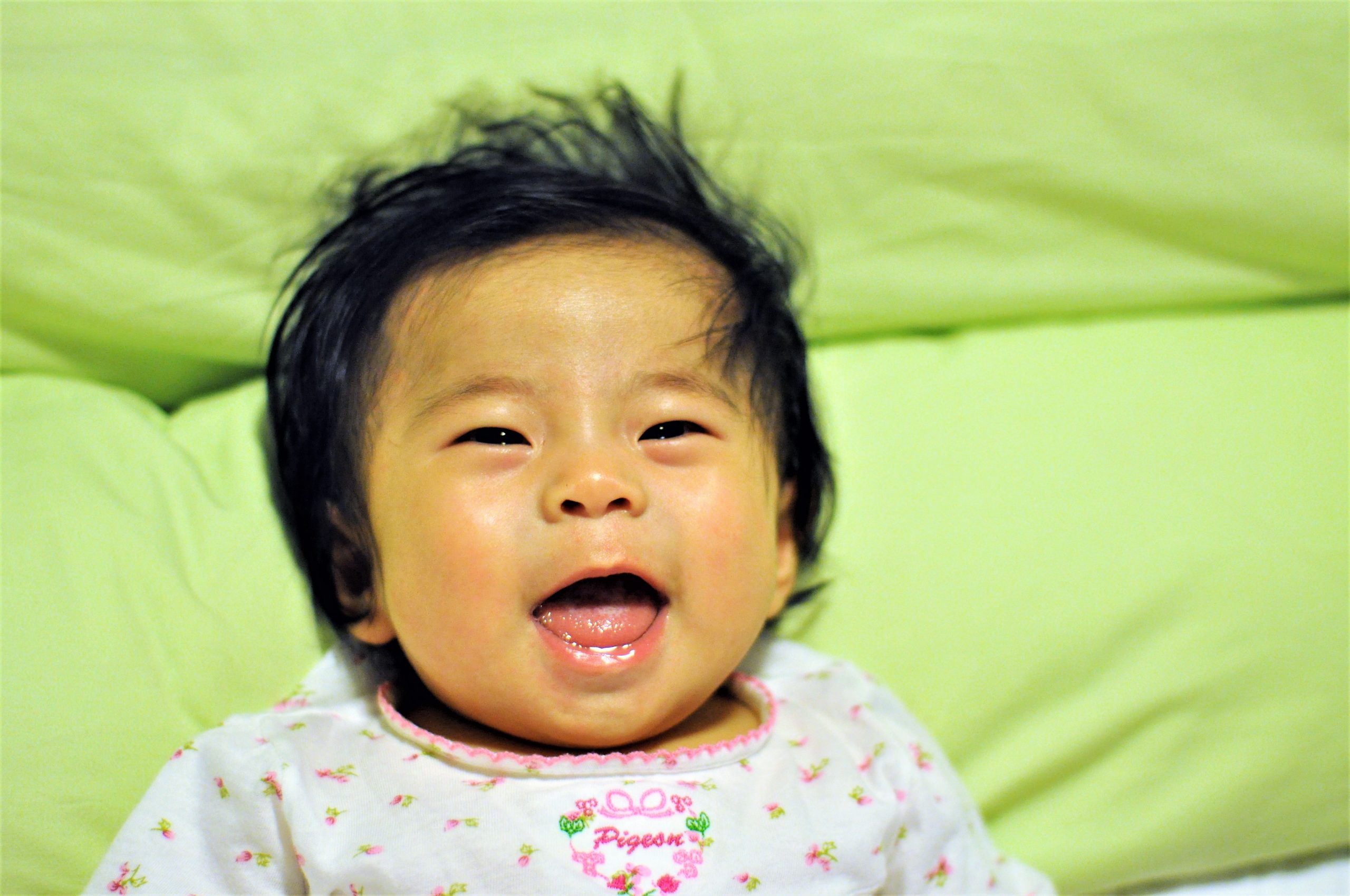
Chloe at three months. She was born seemingly healthy and was even ahead of the curve in development until she was about five months old.
As Chloe neared her sixth month, though, the Mahs noticed that she was not hitting her growth milestones.
“Doctors say children with Pompe disease should not grow so well. She is really very different.”
“She couldn’t roll over on her tummy or lift up her head. She wasn’t interested in her toys. She was weaker and floppy. It was taking her longer to finish her milk.
“She was our first baby. We thought: Maybe some kids are just slower in their development.”
At the advice of her paediatrician, Chloe was given a thyroid test and a Down Syndrome test. Both came back negative.
A growth hormone specialist at KKH ruled out global development delay.
More specialists were consulted, including a neuro-muscular doctor and a geneticist.
The first miracle
But before the specialists could see Chloe, she fell ill. She was seven months old then.
“We had to be mentally prepared that she probably wouldn’t live beyond one.”
“She developed a fever and vomited her milk.”
The initial diagnosis was bronchitis. But when Chloe’s fever spiked erratically for more than a week, the Mahs took her to the A&E.
Recounted Mah on his website: “Chloe was hooked up to several machines, including a respirator.
“Despite appearing normal and rosy to us, the doctor said she was experiencing breathing difficulties.”
A chest X-ray was done to assess the condition of Chloe’s lungs but it was her heart that got doctors concerned.
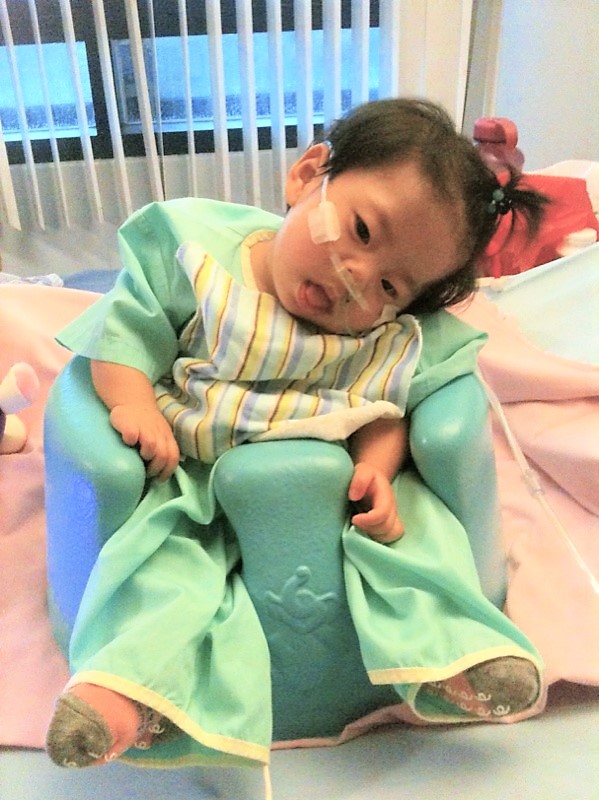
When she was seven months old, Chloe fell ill and had to be hospitalised. It was then that they saw her enlarged heart.
It was enlarged. Cardio scans revealed that her heart muscles had thickened. Congenital heart disease was suspected.
“When the geneticist saw Chloe, she felt God was preparing her to treat Chloe.”
“The doctor came in to tell us that we had to be mentally prepared that if the diagnosis was what they had predicted, she probably wouldn’t live beyond one.”
But it was the geneticist who eventually gave the right diagnosis. And that was nothing short of a miracle, Mah told Salt&Light.
Two weeks before, a colleague of the geneticist had been tidying her desk when she found a book called The Cure, which she passed to the geneticist.
It was based on a true story of a father whose two children had been diagnosed with a rare condition – Pompe disease – and his search for a cure.
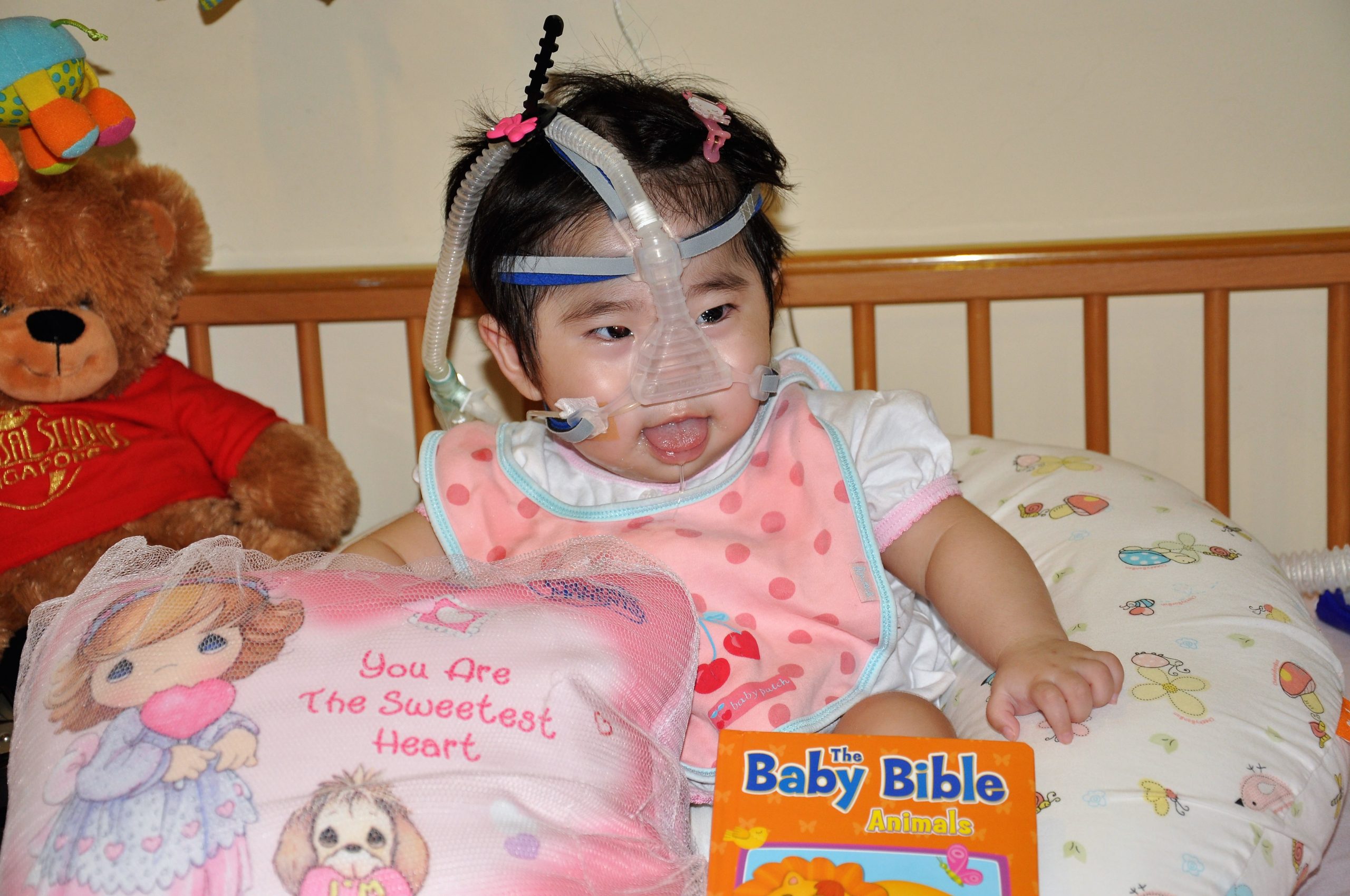
One-year-old Chloe. After going through several tests, it was a geneticist who recognised her symptoms and diagnosed her with the rare genetic disorder, Pompe disease.
It was only because the geneticist read the book that she was able to recognise the symptoms when she examined Chloe.
No one in Singapore had ever been diagnosed with Pompe disease till then.
Said Mah with wonder: “When she saw Chloe, she felt God was preparing her to treat Chloe. She felt our paths crossed not by coincidence. It was planned.”
Tears … then peace
While they waited for the test to confirm the diagnosis, Mah’s brother-in-law came to visit. He brought his pastor to pray for Chloe.
“When they came to share about God, I was desperate. I was willing to listen to whoever could save my child,” admitted Mah.
It was not his first encounter with Christianity.
“I told myself that – even without a miracle – I would believe first. I would surrender.”
In secondary school, the free-thinker had opted to study Bible Knowledge as a subject even though he could have chosen to study other religions. Asked about his decision, Mah was not able to give a reason.
In polytechnic, he would get to hear the Gospel again.
“People came to share the Bible. I knew the Bible. So, I challenged them.
“I thought: If God shows me a miracle, I would believe in God. You say how great, how good, God is. If it is true, then let God perform a miracle in my life. Then, I would really believe in Him.”
But when Mah’s brother-in-law and pastor came to share the Gospel with him at the hospital, Mah simply “started praying”.
“I told myself that – even without a miracle – I would believe first. I would surrender. I felt that when I was young, my approach (to God) may have been wrong.”
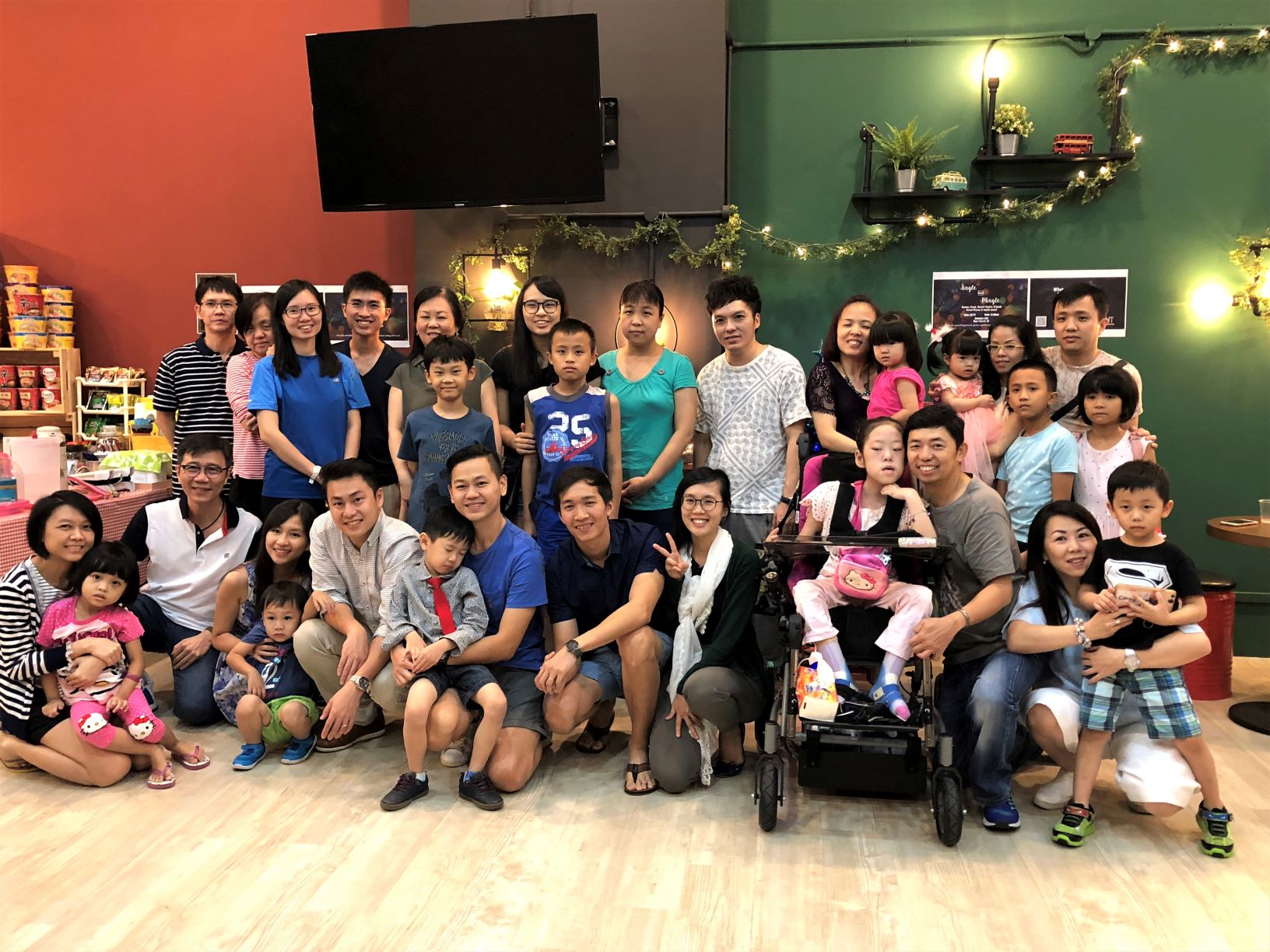
The Mahs with their children, Chloe and Cayden (right), and their church friends. It was Chloe’s illness that opened the door for Mah to receive the Gospel and go to church with his wife.
Patricia had been a Christian before they married.
“When we started to sing during worship, the Holy Spirit came on both of us and we both just cried and cried.”
Now, husband and wife were invited to church again.
“When we started to sing during worship, the Holy Spirit came on both of us and we both just cried and cried. We couldn’t control ourselves.
“It was the first time I felt the Holy Spirit come into our lives and change our lives,” said Mah.
“We cried it out at the service and they prayed for us after the service. After that, we felt peace.
“We hadn’t cried when the whole diagnosis started but we didn’t feel good. At the service, we cried and it brought peace to us.
“This was how my new life started.”
Here for a purpose
When the test came back and Pompe disease was confirmed, the Mahs had to decide whether to proceed with treatment.
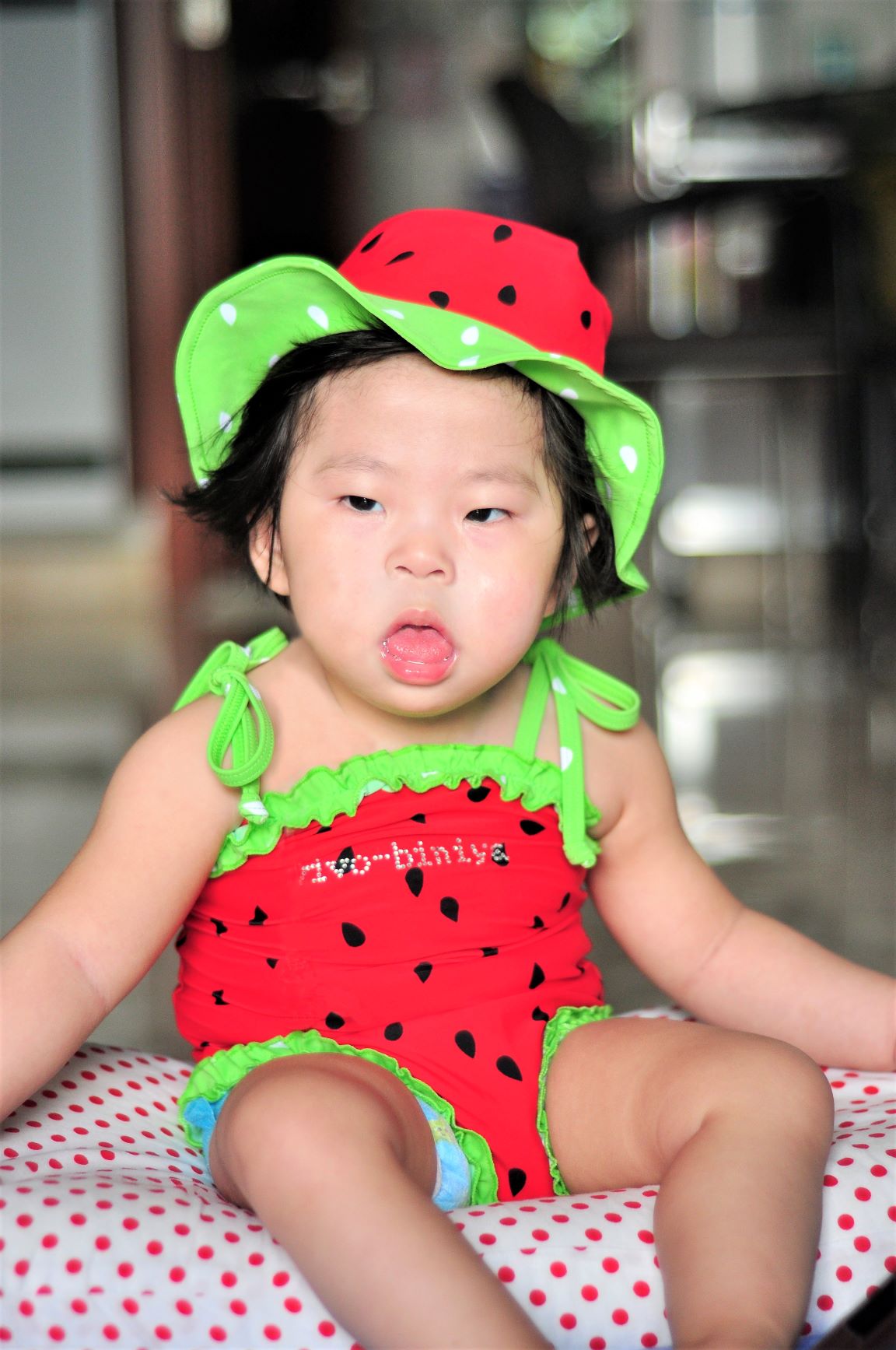
Chole at two. The Mahs struggled with their decision to treat their daughter for Pompe disease, afraid that they would be prolonging her suffering instead.
There is only one treatment for Pompe disease – enzyme replacement therapy (ERT).
“We decided that it was God’s way of telling us to let her go through with the treatment.”
But it comes with the side effects of fever, allergic reaction, headaches, tremors, nausea and vomiting. There was also no guarantee that Chloe would respond to the treatment or when she would respond to it.
Even if she did respond, doctors feared her heart would eventually fail because it was so weak. Chloe might live out her few years in a wheelchair, fed by a tube.
The Mahs wondered if they were only prolonging Chloe’s suffering.
“What if the doctors’ predictions come true? What if she starts to understand and blame us for keeping her alive when she cannot do what a normal person can do?” thought Mah.
Yet, as parents, they felt they had to give their only child at least a fighting chance.
“She is very brave. I tell her, ‘You are here for a purpose … God wants you to glorify His name.’”
So, they prayed and asked God for a sign.
That was when they saw how hard their daughter fought to stay alive.
Although just eight months old then, they saw her try very hard during her physio-therapy sessions. They witnessed her getting stronger and happier daily.
“We decided that it was God’s way of telling us to let her go through with the treatment and that there will be a miracle healing for her,” said Mah.
They embarked on ERT and Chloe responded well to the treatment.
After 48 days, she was discharged. Almost every week since then, she has had to undergo an enzyme infusion.
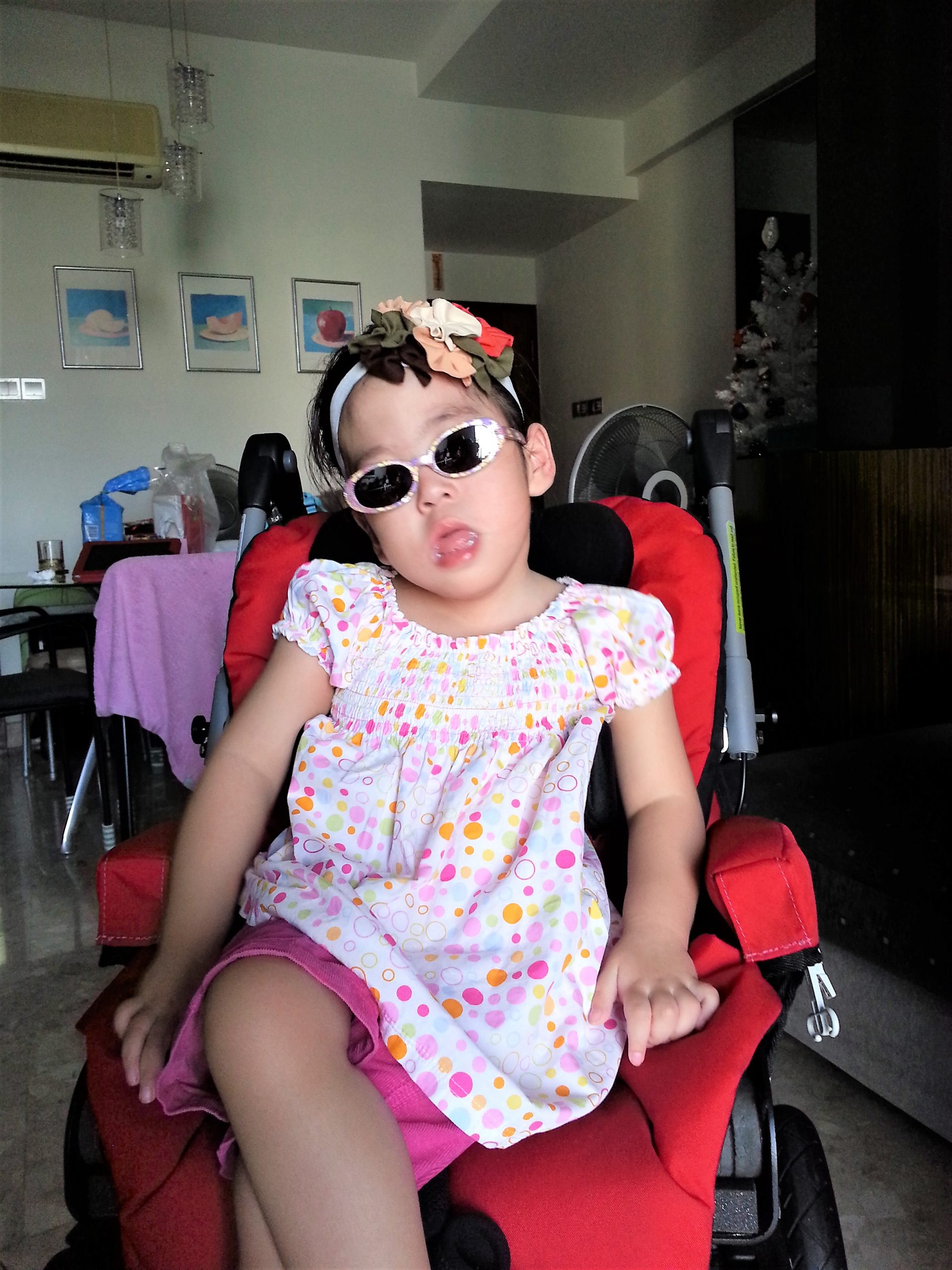
Three-year-old Chloe showing her love of fashion even at that young age. She continues to love dressing up.
“She is very brave. I tell her, ‘You are here for a purpose. If your job is not done, then behave and do well. God wants you to glorify His name.’”
Supporting others who struggle too
Once home, the Mahs had more decisions to make. Chloe needed full-time care. Mah closed his mobile business to be her caregiver while his wife continued to work.
“I know it’s usually the mummy who stays. But there are things that I needed to do for Chloe that are very painful for mum.
“We have to suction her – insert a catheter into her nose and mouth. She would struggle and cry. Mummy wasn’t ready.
“I tell myself to be tough. I pray to God and He encourages me and gives me the peace.”
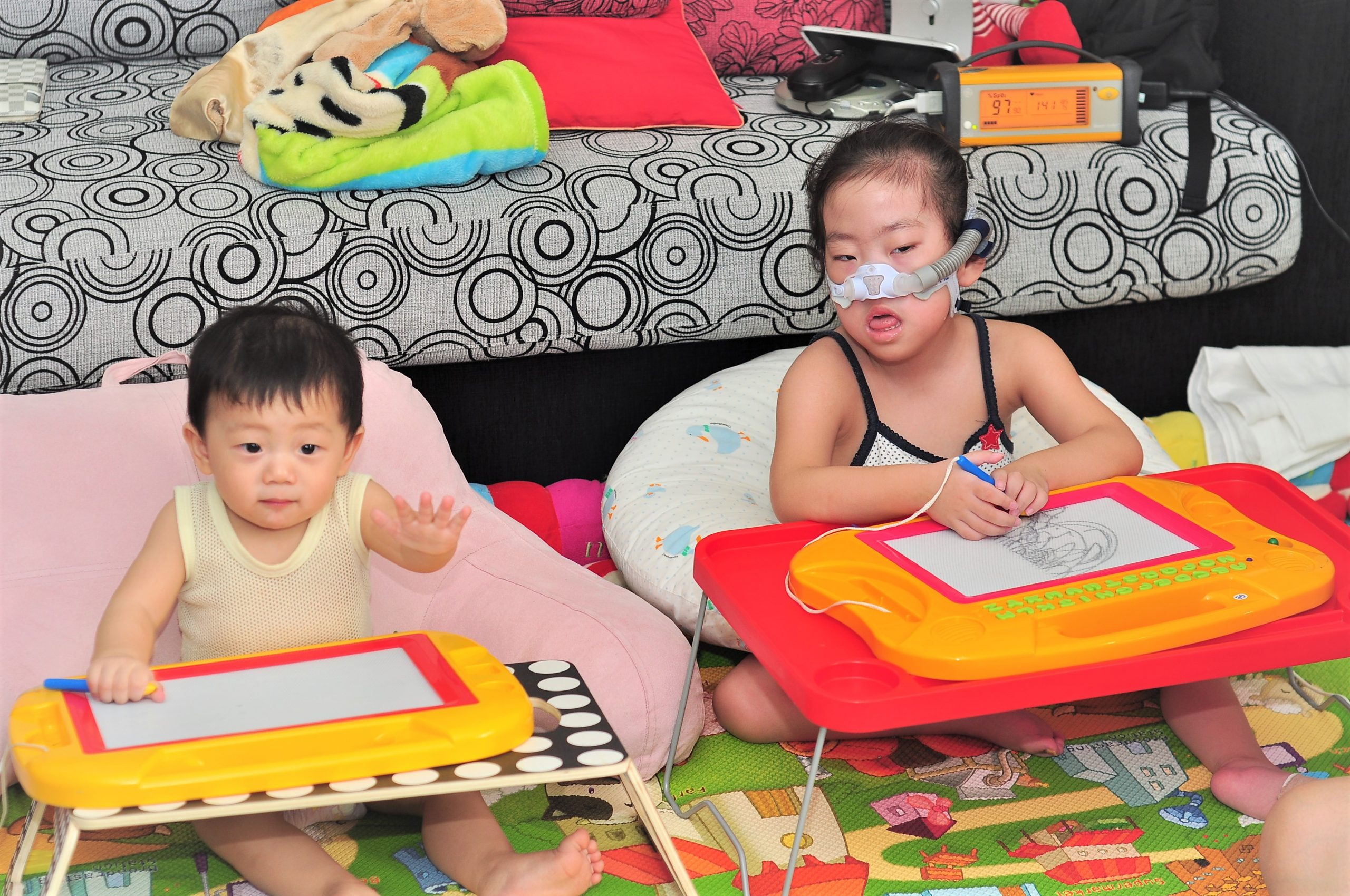
Chloe with her brother, Cayden (left), who is now nine. Mah makes sure that he gives Cayden enough time as well, driving him to and from school.
Down to one income, the family knew finances were another concern.
Apart from near weekly ERT which costs $9,500 a session, Chloe also needs other medical support – ventilator to assist in her breathing, feeding tube, equipment for her respiratory and feeding care, therapies to help her speech and mobility, and medication. Milk and diapers add to the cost as well.
“I don’t know why they approved it. I only know that I prayed for it and God showed me that He could take care of things.”
In the initial years, Chloe’s expenditure came up to $300,000 a year. Now, it is closer to $600,000 because treatment costs increase according to Chloe’s weight.
Here is where God showed His hand of provision again. First, Chloe’s doctor managed to convince the pharmaceutical company to give the Mahs a 50% discount for the treatments.
Then, they got their insurance company to reimburse them for Chloe’s medical costs.
“The medical social worker had told me not to waste my time making claims because usually insurance companies don’t recognise treatments like ERT,” said Mah.
“I said, ‘No, I just want to try. I will leave it up to God, but I just need to ask the insurance company.’”
In 2013, Mah managed to get medical insurance to cover Chloe’s ERT cost.

Five-year-old Chloe. Medical care for Chloe now amounts to between $500,000 and $600,000. The Mahs consider it a miracle that they were able to claim insurance for her ERT.
“I don’t know why they approved it. I only know that I prayed for it and God showed me that He could take care of things.”
“I prayed, ‘God, if you take care of the challenges at home, then I can do this.’ And God did.”
The family struggled to manage a disease so rare that Chloe is, to date, the only survivor of the condition in Singapore. That spurred Mah to start a charity to help other families like him.
In June 2011, he set up the Rare Disorders Society (Singapore) (RDSS). Mah told Salt&Light that he credits God for giving him “the strength, knowledge and determination to establish a non-profit organisation”.
“At the time, I knew nothing about running a charity. I had never even volunteered with a charity before.
“I prayed, ‘God, if you take care of the challenges at home, then I can do this.’ And God did.”
RDSS supports some 150 families with children who have rare medical conditions by raising funds for medical equipment, offering support and connection for families, creating awareness and providing information.

Mah set up the Rare Disorder Society (Singapore) to provide support for other families who have loved ones with rare diseases. They have since raised $1 million for the 150 families.
“Taking care of a child with a special condition is not easy. Not many of your friends will understand what you are going through because they don’t have kids like yours.
“Every single dollar is from the public. God really opened the way.”
“If you need someone to talk to about challenges and problems, these special parents are the ones you can turn to. RDSS is a safe place to meet and talk and share.”
RDSS does not sponsor medical treatment. Instead, the money goes to alleviating the cost of medical consumables such as filters for ventilators, tubes, syringes, gauze and gloves.
“I’m Chloe’s full-time caregiver but I am also a professional beggar,” said Mah with a laugh.
“I share about our cause to get people to donate. Every single dollar is from the public. God really opened the way.”
God, please save her
Since her diagnosis, Chloe has undergone several medical procedures.
“Going through surgery was high-risk. I saw it as God upgrading her so she can continue her journey.”
In 2012, she went for a surgery to insert a feeding button into her stomach, replacing the feeding tube.
“Going through surgery was high-risk for her. So, we prayed. I saw it as God upgrading her so she can continue her journey.”
The surgery was a success.
Three years later, Chloe did so well that her cardiologist stopped her heart medication because she was no longer at risk of heart failure. Again, a miracle.
In 2019, she underwent a tracheostomy to insert a tube into her windpipe to allow air into her lungs. The surgery went well.
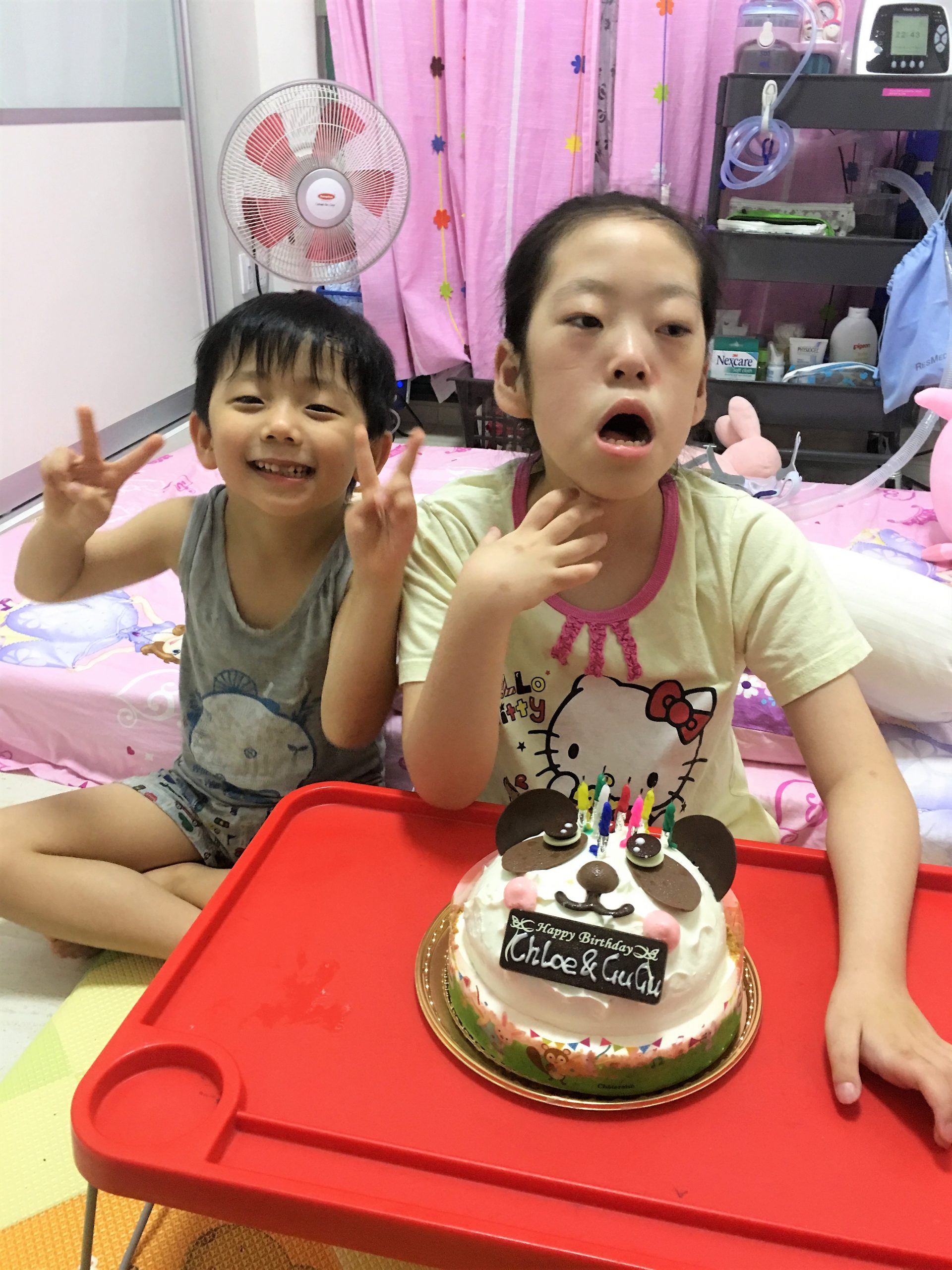
Cayden and Chloe get along very well. They are seen here celebrating Chloe’s eighth birthday.
But there have been several scares too. The closest call happened when Chloe was nine.
“Before I gave her CPR, I prayed that God would use my hands to revive her.”
Her heart rate and oxygen levels suddenly dropped, and she stopped breathing entirely. She had suffered a cardiac arrest.
Mah was the one who leapt into action to save his daughter, giving her cardiopulmonary resuscitation (CPF) for nearly 15 minutes before the ambulance arrived.
“Before I gave her CPR, I prayed that God would use my hands to revive her. My mind was a blank but I could still do what I was taught.
“Ask me to recall the incident, I’m a blank. But I remember I prayed, ‘God please save her.’”
Chloe survived with no damage to her brain.
“She was admitted to the ICU and was supposed to go through a CT scan to see if she was okay.
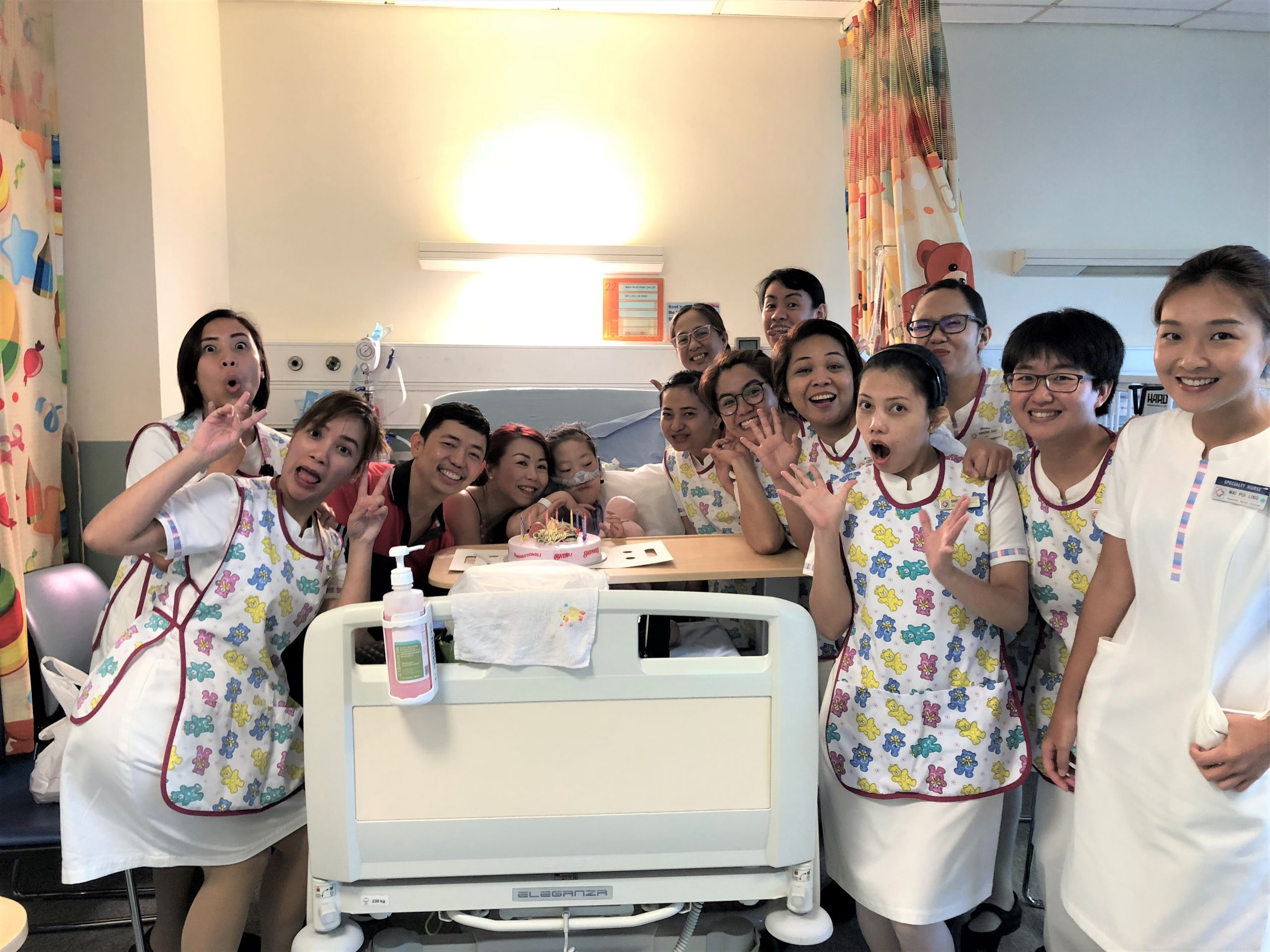
Nine-year-old Chloe in the year that she suffered heart failure and stopped breathing. Her father (third from left) performed CPR to revive her.
“Upon waking up, the first thing she asked for was her iPad and she started playing games. The doctor said, since she could play this game, she was probably back to her old self.
“They called off the test.”
Because of the incident, Mah also found the answer to a question he struggled with: Was it kinder to simply let Chloe go or fight to keep her alive?
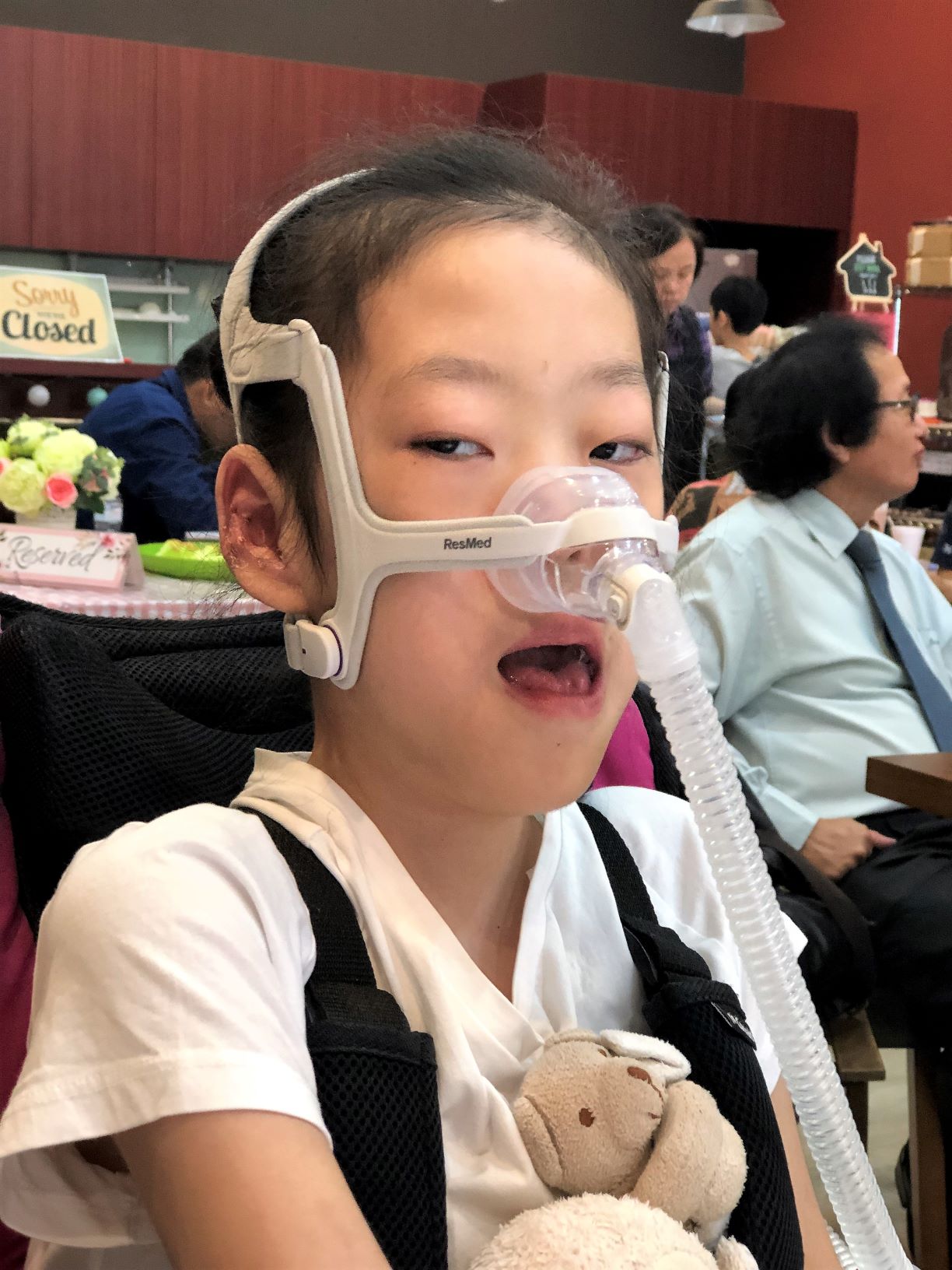
Mah says that what he admires most about his daughter, seen here at age 10, is her fighting spirit and how she never lets her condition get her down but, instead, works around it to live like a regular tween.
“God has given Chloe a second life through my breath and hands,” he said.
“I have been given a job to care for Chloe. I will just do it for the rest of my life.”
“All these years I have been praying for proper closure when the time is up.
“I believe that, through this experience, He is answering my prayers.
“Because I wasn’t willing to let her go like that, I am glad I did what I needed to and did not hold back. So, God has taught me a lesson about not doubting myself.”
While the Mahs have prayed for healing, they have never asked why Chloe has Pompe disease.
“If you ask this, at the end of the day, she still has the disease. I think there is a purpose for this,” said Mah.
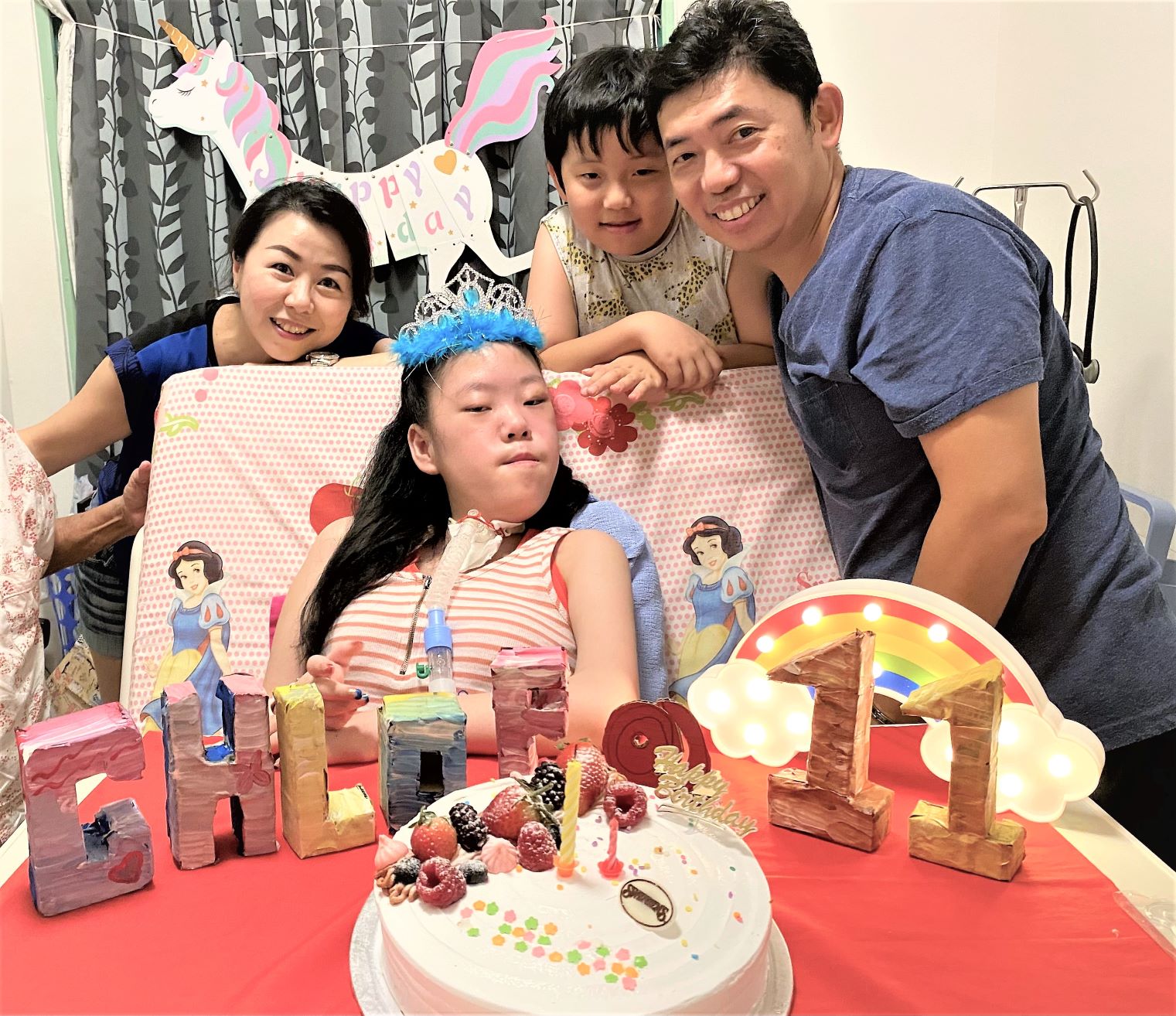
Chloe celebrating her 11th birthday with (left to right) mum Patricia, brother Cayden and dad Kenneth Mah. Every birthday of Chloe’s is a miracle for the Mahs who were told that she would not live past her first year.
“Because of her, we have a charity. Because of her, people are talking about rare diseases in Singapore. Because of her, there is more understanding.
“As to why it’s happening to our family, only God can answer. I am just a servant to God. I have been given a job to care for Chloe, I will just do it for the rest of my life.”
Gene replacement therapy is now in the human trial stage. If approved, Chloe’s defective gene could be replaced and she could be cured.
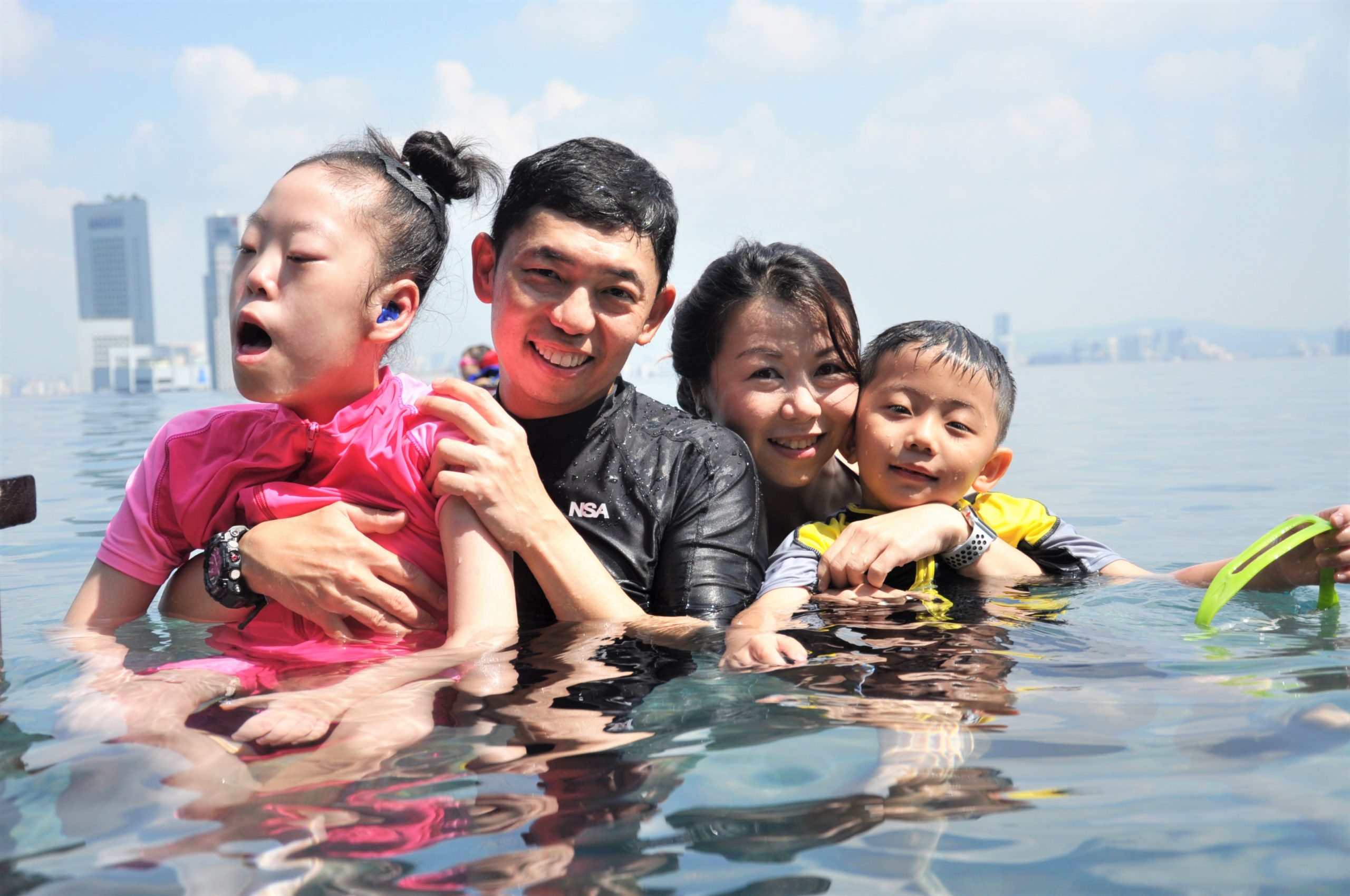
Chloe is doing so well that there are no more milestones against which they can measure her because she is the only one who has survived this long with her condition.
Meanwhile, the tween is blazing a trail.
“We can’t set milestones for her anymore because there is no similar case that we can use as a reference for her. She is the only one who has survived this long.
“We know that Chloe is here to glorify His name.”
RELATED STORIES:
“Disabled does not mean unable”: 10 persons with special needs ascend Mount Fuji
Three children with fatal genetic disorder, yet David Lang sees God’s sovereignty
“Nigel and Donavan, one day we’ll meet again,” say parents of boys in tragic Tampines accident
HOW TO DONATE TO THE RARE DISORDERS SOCIETY (SINGAPORE)
The Rare Disorders Society (Singapore) is an independent charity that serves children living with rare disorders.
The Society does not receive financial help from the government, Community Chest and other agencies in Singapore. RDSS has been raising funds on its own to finance the various programmes and activities for the benefit of its members.
To make a donation, click here.
We are an independent, non-profit organisation that relies on the generosity of our readers, such as yourself, to continue serving the kingdom. Every dollar donated goes directly back into our editorial coverage.
Would you consider partnering with us in our kingdom work by supporting us financially, either as a one-off donation, or a recurring pledge?
Support Salt&Light